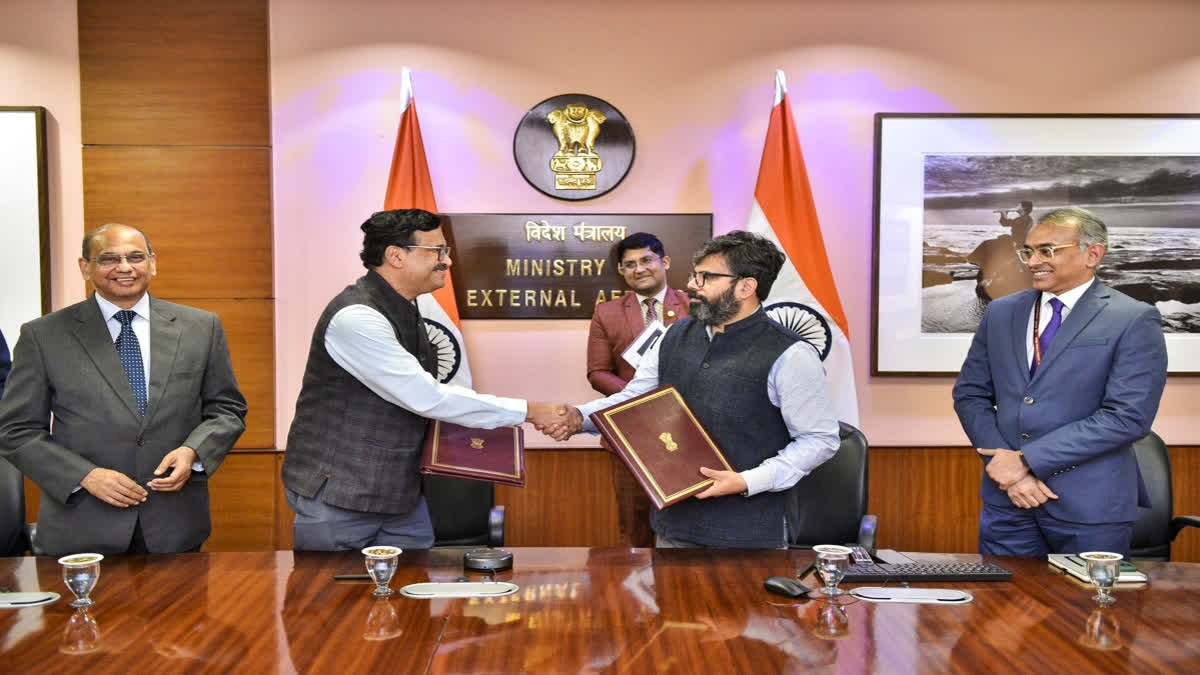New Delhi: In a major development, India’s Ministry of External Affairs signed a Project Implementation Agreement with the International Solar Alliance (ISA) on Tuesday, which aims to operationalise solar energy projects in Comoros, Fiji, Madagascar, and Seychelles.
The ISA, as the project implementing agency (PIA) would provide programmatic assistance to these Indo-Pacific countries. These projects underscore India's Quad commitment to renewables and just energy transitions in island nations of the Indo-Pacific.
According to the Ministry of External Affairs, the Wilmington Declaration released at the Quad leaders' summit in Delaware, USA on 21 September this year, stated that the Quad countries will work together, through policy, and public finance, to operationalise their commitment to catalyse complementarity and high-standard private sector investment in allied and partner clean energy supply chains. To this end, India has committed to invest USD 2 million in new solar projects in Fiji, Comoros, Madagascar and Seychelles with financial support from India.
As per a study undertaken by the ISA, the countries under consideration for solar projects have energy issues related to the perishability of agricultural products, unreliable electricity supply in health centres and for irrigation purposes in remote areas where grid power supply or solar mini-grids are not available yet.
Based on discussions with the project recipient countries, solar projects in the areas of cold storage, solarization of health care facilities and solar water pumping systems are under consideration. The successful execution of these projects is expected to enhance energy access, create employment, and provide reliable and quality power supply in these Indo-Pacific countries.
Expert's view
Speaking to ETV Bharat, Dr Mansi, Assistant Professor at Amity University, Haryana and an expert in geopolitics and India in Indo-Pacific, said, "India currently holds the presidency of ISA and this agreement not just reinforces India's commitment to the solar energy under its Panchamrit initiative for climate action but also its Indo-Pacific Ocean Initiative (IPOI) and Island Diplomacy in the Indo-Pacific region. The geopolitical waters of Indo-Pacific is increasingly becoming a contested place with the great power rivalry between the US and China".
"Both these countries are trying to woo the small island nations of the region and expand their military and economic influence. In the case of India, the outreach to these island nations is also a way to counterbalance Chinese influence and provide an alternative to the China-led initiative. Basically, countering the Chinese string of pearls with that of ‘necklace of diamonds’. The initiative taken under the garb of non-traditional security like climate change has the potential to boost India's position and add to its image as a major player in the region," she added.
About International Solar Alliance
India and France launched the International Solar Alliance, which is a 'treaty-based international intergovernmental organization', back in 2015 on the sidelines of COP21 in Paris, to promote the deployment of renewable energies in the Indo-Pacific region. With the objective to advance solar power adoption for a carbon-neutral future, ISA aims to combat climate change by implementing solar energy solutions. Now in the context of the Indo-Pacific, climate change and the rising sea level is the existential threat, mainly for the small island nations of Indian and Pacific oceans.
The expert further said, "When it comes to QUAD, India aims to avoid any perception that the QUAD is a military bloc, or a grouping to counterbalance China, instead steer it toward a more comprehensive role in addressing the non-traditional security challenges, like the climate change, natural disaster, physical and digital infrastructure building, maritime security, AI et al. The QUAD also recognises climate change as an existential threat, particularly to the island nations of the Pacific and Indian Oceans. In response, the US, Australia, and Japan are taking proactive measures to mitigate and adapt to climate change, promote clean energy, and support sustainable development".
Dr Mansi asserted that India can expand its partnership and collaboration with the QUAD countries, in a bilateral or plurilateral setting to address climate-related issues.
India's commitment to solar energy
India has made significant strides in its commitment to solar energy, reflecting its goal to address both energy security and climate change. As of recent years, India has become one of the world leaders in solar power deployment, with ambitious targets and policies to promote renewable energy.
India is a key player in the ISA, a coalition of 121 countries, aimed at promoting solar energy adoption in countries with high solar potential. India set a target of 100 GW of solar power capacity by 2022 under its National Action Plan on Climate Change (NAPCC), which was later updated to 500 GW of non-fossil fuel capacity by 2030. This includes solar, wind, and other renewable source. By 2030, India aims for renewables to make up 50% of its total energy mix.
It is pertinent to note that India plays a significant role in the Quad Climate Working Group (CWG), which was launched by the Quadrilateral Security Dialogue (Quad)—a strategic group consisting of the United States, Japan, Australia, and India. The initiative aims to address global climate challenges and promote sustainable, low-carbon economic growth, while focusing on areas such as clean energy, climate adaptation, and resilience-building, particularly in the Indo-Pacific region.



